Instituto Cervantes en Reino Unido: Aviso importante sobre clases ‘online’, exámenes oficiales y actividad cultural
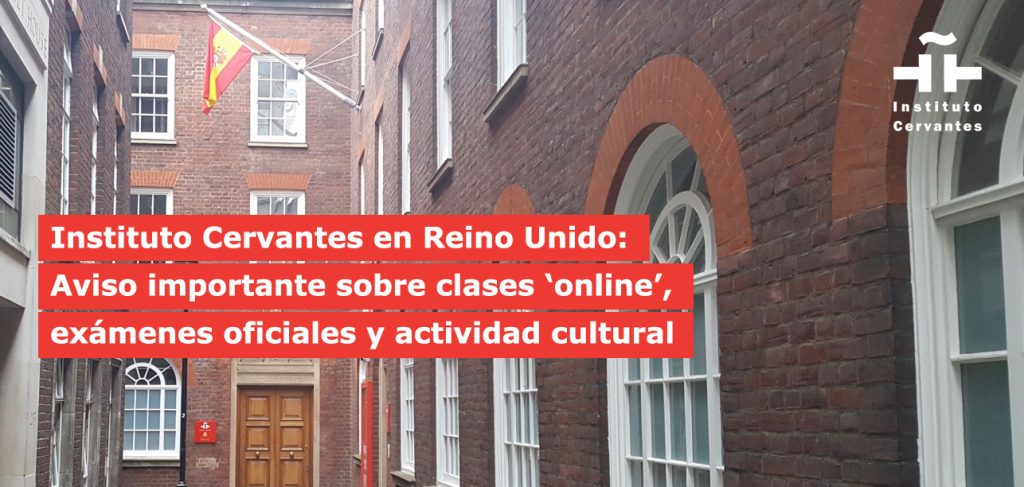
Ante la alerta sanitaria provocada por el coronavirus COVID-19, el Instituto Cervantes en Reino Unido, siguiendo las directrices de las autoridades británicas y españolas, ha decidido, con el fin de proteger la salud de todos, la transferencia de sus clases presenciales a la formación en línea y la suspensión de su programación cultural. Estas medidas afectan a los centros de Londres, Mánchester y Leeds hasta nuevo aviso.
Por favor, consulte las webs del Instituto Cervantes en Manchester y Leeds para saber más detalles y leer más avisos.
MEDIDAS PARA LONDRES
- En el ámbito académico, las clases de grupo presenciales quedan suspendidas desde el martes 17 de marzo en el centro de Londres. Continuaremos impartiendo nuestras clases a distancia a partir del viernes 20 de marzo. El martes 17, miércoles 18 y jueves 19 NO habrá clases ni presenciales ni en línea y se recuperarán al final de cada curso.
El profesor encargado de cada grupo contactará a la mayor brevedad con sus estudiantes para darles detalles precisos sobre la puesta en marcha de las clases por vía telemática y sobre la recuperación de las clases no impartidas los días 17, 18 y 19.
Los cursos de español a través de Internet Ave Global, así como el resto de la formación en línea del Instituto Cervantes, siguen operativos.
El examen CCSE programado para el día 26 de marzo en el centro de Londres sigue en pie.
Los exámenes DELE de mayo quedan suspendidos. A los alumnos inscritos se les contactará desde el centro para reagendar su examen para las convocatorias de julio o septiembre.
- Las actividades culturales programadas quedan aplazadas
- Nuestras bibliotecas permanecerán cerradas, prorrogándose todos los préstamos actuales durante el tiempo de cierre. Se seguirán manteniendo todos los servicios de nuestra biblioteca electrónica. Sugerimos asimismo consultar el canal de Youtube de cada centro (Londres, Mánchester, Leeds).
Rogamos seguir con atención todas las comunicaciones realizadas por este medio, así como las publicaciones de nuestro portal y de nuestras redes sociales, pues iremos informando puntualmente de la evolución de la situación, y avisaremos también a través de ellos de la normalización de nuestras actividades.
Para cualquier consulta o información adicional, se puede contactar con nosotros a través de los correos electrónicos de Londres (cenlon@cervantes.es), Mánchester (cenman@cervantes.es) and Leeds (cenlee@cervantes.es).
En el Instituto Cervantes seguiremos prestando la máxima colaboración a las autoridades y llevando a cabo, con el mayor esmero y la mayor celeridad posibles, cuantas recomendaciones se indiquen con el fin de evitar la propagación del coronavirus COVID-2019.
STATEMENT BY INSTITUTO CERVANTES IN THE UK ON COVID-19 (CORONAVIRUS)
In light of the recent health alerts regarding the Coronavirus, we would like to assure you that the centres of the Instituto Cervantes in UK (Leeds, London and Manchester) remain open, with courses and events continuing as usual. We are keeping track of any new information or advice from Public Health England, the NHS and UK Government on the matter and will adopt any recommendations accordingly. Likewise, we urge the responsibility of our students to follow the hygiene measures and indications recommended by the British health authorities:
Furthermore, due to the risk of spread of the COVID-19 virus, it is requested by both the UK and Spanish health authorities that any person who has recently travelled to China (mainland China, Hong Kong, Macao), Singapore, South Korea, Iran or Italy shall self-isolate themselves at home for a period of 14 days on their return. This applies as well to any person who has been in close contact with a confirmed case of coronavirus.
If any of the abovementioned situations apply to you, we would be grateful if you could inform us. We will then alert the HSE and follow their recommendations on risk assessment. We will implement any measures and treat any specific case following the advice of the appropriate authorities.
The health and wellbeing of our staff and students remains our top priority and we will continue monitoring the situation and acting upon the information made available to us by the HSE.
COMUNICADO DEL INSTITUTO CERVANTES DEL REINO UNIDO SOBRE COVID-19 (CORONAVIRUS)
Ante la situación creada por la alerta sanitaria debida al Coronavirus, los Institutos Cervantes del Reino Unido (Leeds, Londres y Mánchester) comunican que los centros continúan abiertos y ofrecen sus cursos y sus actividades culturales programadas. Estamos pendientes de cualquier nueva información o medida que Public Health England, el NHS o el Gobierno de Reino Unido comuniquen al respecto con el fin de adoptar sus recomendaciones. Igualmente, instamos a la responsabilidad de nuestros alumnos para que sigan las medidas de higiene e indicaciones recomendadas por las autoridades sanitarias británicas:
Por otro lado, debido al riesgo de propagación del virus COVID-19, tanto las autoridades sanitarias del Reino Unido como las españolas solicitan que cualquier persona que haya viajado recientemente a China (China continental, Hong Kong, Macao), Singapur, Corea del Sur, Irán o Italia se aísle en casa por un período de 14 días a su regreso. Esto se aplica también a cualquier persona que haya estado en contacto cercano con un caso confirmado de coronavirus.
Si usted está en alguna de las situaciones mencionadas anteriormente, le agradeceríamos que nos informara cuanto antes. El Instituto dará parte al HSE y seguiremos sus recomendaciones sobre la evaluación de riesgos. Implementaremos cualquier medida y trataremos cualquier caso específico siguiendo el consejo de las autoridades correspondientes.
La salud y el bienestar de nuestros estudiantes y nuestro personal ha sido y sigue siendo nuestra prioridad principal y continuaremos monitorizando la situación y actuando de acuerdo con la información que HSE pone a nuestra disposición.
Instituto Cervantes comes to Scotland

The director of Instituto Cervantes, Luis García Montero, and the head of the Spanish Department of the University of Aberdeen (Scotland, United Kingdom), Jesse Barker, signed an agreement for academic and cultural cooperation that makes the university an official examination centre for the Spanish Diploma (DELE) administered by Cervantes.
The signed agreement integrates the School of Language, Literature, Music and Visual Culture of the University of Aberdeen into the network of Instituto Cervantes’ examination centres in the United Kingdom. The first exams will be held next May with the support of Instituto Cervantes in Manchester (England), the centre to which the agreement is attached.
With the agreement signed in the third most important city in Scotland, the presence of Instituto Cervantes in the north of Great Britain is being reinforced, with the aim of meeting the growing interest of British students to obtain the DELE diploma and internationally recognised certification of a command of Spanish.
The University of Aberdeen joins three other Scottish educational centers that hold DELE exams: the University of Strathclyde (Glasgow), the Edinburgh College (Sighthill Campus) and SALT Edinburgh: Academy of Language and Translation in Edinburgh. The number of candidates in Scotland increased by 60% in 2019 compared to the previous year, and a similar growth is expected in 2020.
«Spanish Ambassadors»
The presence of Instituto Cervantes in the north of the United Kingdom, and in Scotland in particular, has been reinforced in recent years. This is attributable to the joint planning of cultural activities with Scottish universities from the centre of Manchester with a focus on history, art, literature and cinema. The Spanish cultural offer includes the launch of the «Luis Buñuel Film Club» at the universities of Aberdeen and Strachclyde (Glasgow) and the «Spanish Ambassadors» programme, aimed at young university students interested in spreading the Spanish language and the Spanish-speaking culture.
García Montero has also met with the heads of the Spanish departments of four other Scottish universities (Edinburgh, Dundee, Strachclyde and Saint Andrews) og which he thanked for their work in promoting Spanish whilst also encouraging them to propose initiatives that increase the Students’ interest in the Hispanic world. The Spanish Consul General in Edinburgh, Ignacio Cartagena Núñez, and the director of the Cervantes Institute in Manchester, Francisco Oda-Ángel, participated.
On the invitation of the Lawyers Without Borders Students Association of the University of Aberdeen, Luis García Montero also participated in the VI Annual Human Rights Congress, whose central theme revolved around the freedom of artists in the promotion of fundamental rights.
El Instituto Cervantes aumenta su presencia en Escocia

El director del Instituto Cervantes, Luis García Montero, y el responsable del Departamento de Español de la Universidad de Aberdeen (Escocia, Reino Unido), Jesse Barker, firmaron un convenio de cooperación académica y cultural que convierte a dicha universidad en centro oficial examinador del Diploma de Español (DELE) que administra el Cervantes.
El acuerdo suscrito integra a la School of Language, Literature, Music and Visual Culture de la Universidad de Aberdeen en la red de centros de examen del Instituto en el Reino Unido. La primera convocatoria se celebrará el próximo mes de mayo con el apoyo del Cervantes de Mánchester (Inglaterra), centro al que está adscrito el acuerdo.
Con el convenio firmado ayer por la tarde en la tercera ciudad más importante de Escocia, se refuerza la presencia del Instituto Cervantes en el norte de Gran Bretaña, con el objetivo de atender el creciente interés de los alumnos británicos por obtener el diploma DELE, certificación internacional de dominio del español.
La Universidad de Aberdeen se suma a otros tres centros educativos escoceses que celebran exámenes DELE: la Universidad de Strathclyde (Glasgow), el Edinburgh College (Sighthill Campus) y SALT Edinburgh, Academia de Lengua y Traducción en Edimburgo. El número de candidatos en Escocia aumentó en 2019 un 60% respecto al año anterior, y en 2020 se espera un crecimiento similar.
«Embajadores del español»
La presencia del Instituto Cervantes en el norte del Reino Unido, y en particular en Escocia, se ha reforzado en los últimos años gracias a la planificación conjunta de actividades culturales con las universidades escocesas desde el centro de Mánchester, en especial sobre historia, arte, literatura y cine. En la oferta cultural en español destacan la puesta en marcha del «Club de Cine Luis Buñuel» en las universidades de Aberdeen y Strachclyde (Glasgow) y el programa «Embajadores del español», destinado a jóvenes universitarios interesados por difundir la lengua española y la cultura hispanohablante.
García Montero se ha reunido además con los responsables de los departamentos de Español de cuatro universidades escocesas (Edimburgo, Dundee, Strachclyde y Saint Andrews), a quienes ha agradecido la labor en la promoción del español y les ha animado a proponer iniciativas que aumenten el interés de los alumnos por el mundo hispánico. Han participado el cónsul general de España en Edimburgo, Ignacio Cartagena Núñez, y el director del Instituto Cervantes de Mánchester, Francisco Oda-Ángel.
Invitado por la Asociación de Estudiantes Lawyers Without Borders de la Universidad de Aberdeen, Luis García Montero ha participado también en el VI Congreso Anual de Derechos Humanos, cuyo tema central ha girado sobre la libertad de los artistas en la promoción de los derechos fundamentales y donde ha impartido una conferencia.
Oxford celebrates its «valuable relationship» with Instituto Cervantes in the 50th anniversary of the Spanish Faculty
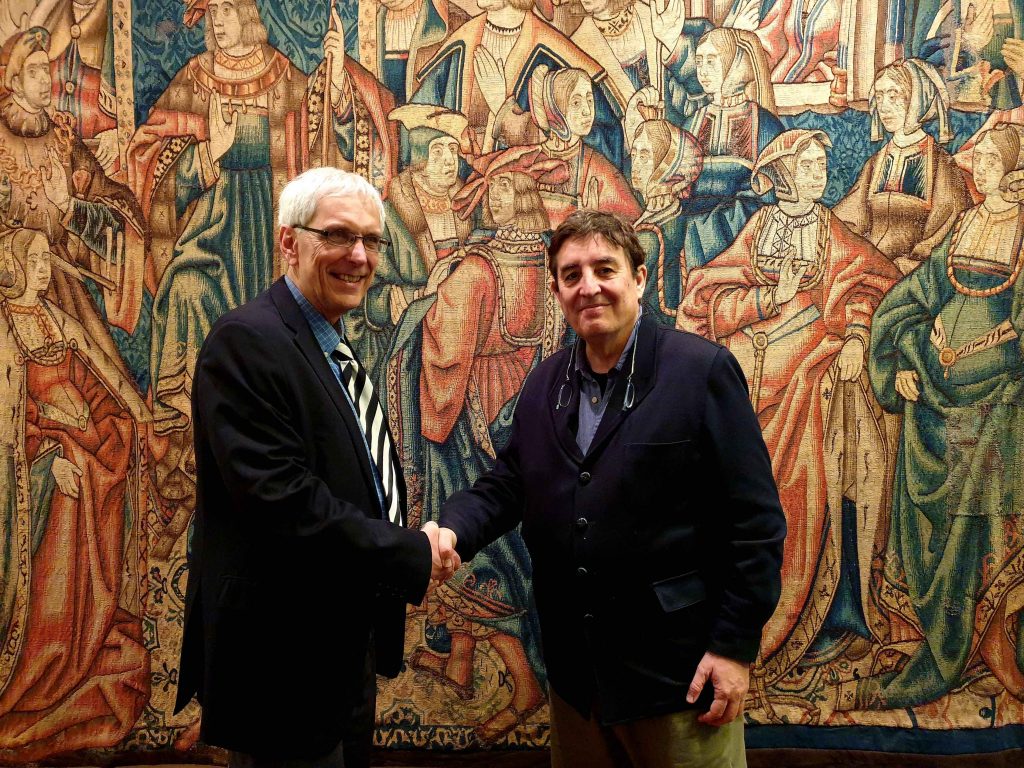
The director of Instituto Cervantes, Luis García Montero, attended today the 50th anniversary celebrations of the Spanish and Portuguese Sub-Faculty at the University of Oxford. Tomorrow, he will sign a memorandum of understanding (MOU) with Magdalen College.
“The participation of Instituto Cervantes in this commemoration is due to the fact that our relationship is very valuable,” said Jonathan Thacker, Professor Alfonso XIII of Spanish studies at Oxford, who explained that although Spanish has been taught at this university for more 100 years, only now does he feel that «it is a really vibrant language».
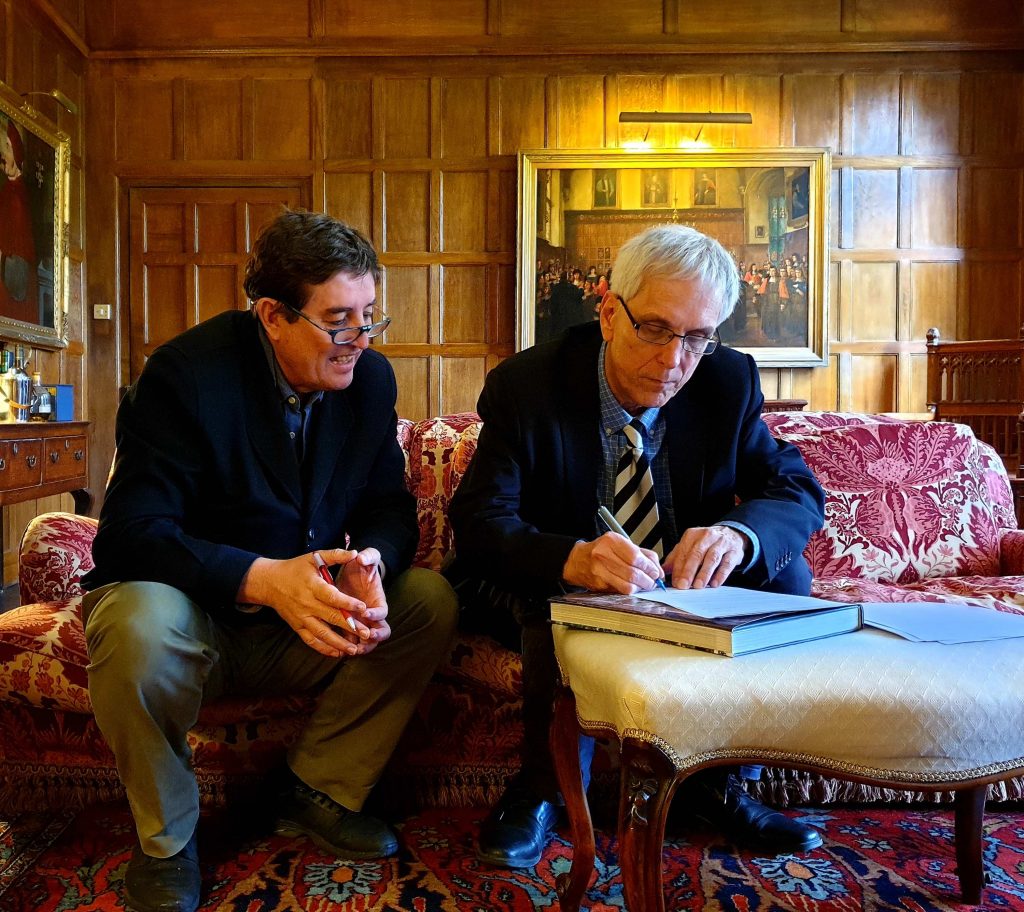
Expert in the Spanish Golden Age, Professor Thacker said that García Montero’s assistance “is not only because he is the director of a very important cultural institution, but also an academic and a poet, producing a type of literature that we teach in Oxford. We wanted this celebration to be a combination of academic content and more vivid content.” Alongside the celebration, there were poetry readings by García Montero himself and Portuguese writer Ana Luísa Amaral to enliven and complement the anniversary.
Memorandum of Understanding with Magdalen College
“This agreement is a recognition of a trajectory that has been underway for a few years and the consolidation of a future collaboration that I wish to be very long. It is about putting in black and white what has been developing for a long time, especially in these last two years,” said the professor of Spanish Medieval Literature and Philology at the University of Oxford, Juan Carlos Conde.
For Conde, the signing of this memorandum is to give, «a naturalisation certificate and secure it for the future.” In fact, it is clear that the presence of Spanish in Oxford is strengthened with two initiatives mentioned in the MOU: the Madariaga Series and the Magdalen Iberian Medieval Studies Seminar (MIMSS).
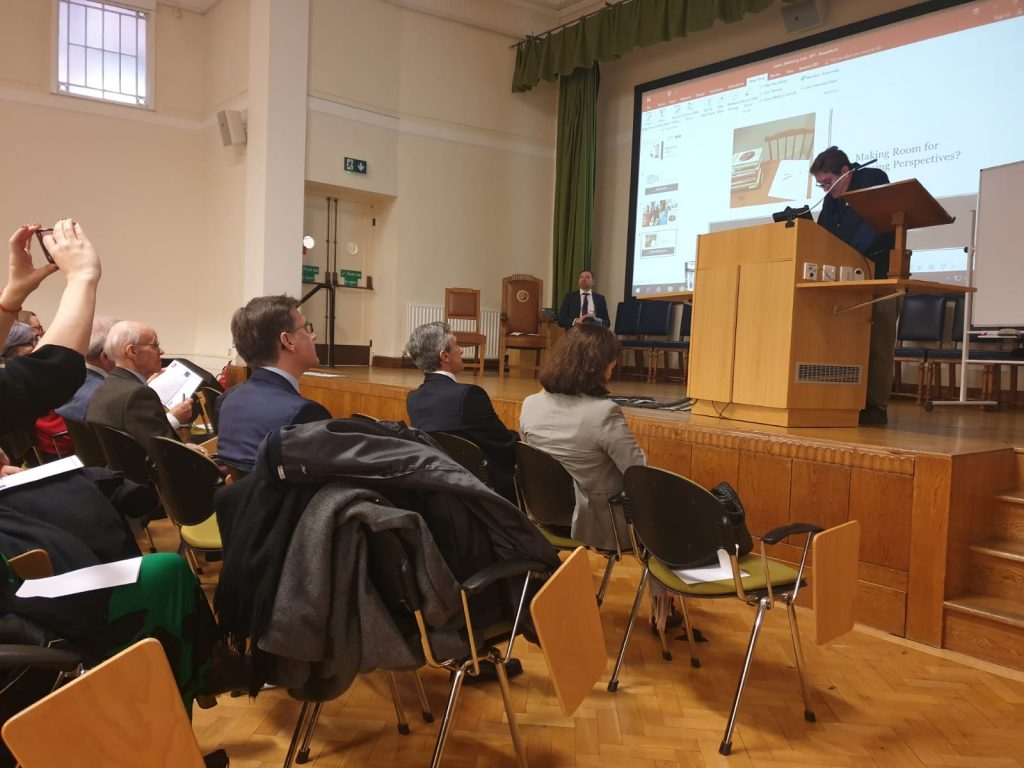
The Madariaga Series is the result of an initiative by a group of postgraduate students at the end of year 2014. Among the first guests in 2015 were figures such as Miguel Ángel Moratinos and Javier Solana. One of the students behind the initiative, Diego Rubio, approached Conde to ask whether Magdalen College could give the series voice and visibility in Oxford. A few months later, they successfully gave the Madariaga Series a “home, roof and shelter, as well as a significant economic contribution.» In the case of the MIMSS cycle, it is the most important medieval studies seminar in the United Kingdom today.
“I want to believe that these activities, in parallel to teaching and training, will contribute to the experience of current and future Oxford students, providing them with a series of opportunities they don’t have in other places,” said Conde.
Spanish students in Oxford
“For undergraduate students who want to study here, they must have previously studied Spanish up to A-levels exams. We have an average of between 300 and 320 students who request to study here and we accept between 70 and 75, that is, one in four students. I think this is a sign of the good health of teaching Spanish in schools,” said Professor Thacker.
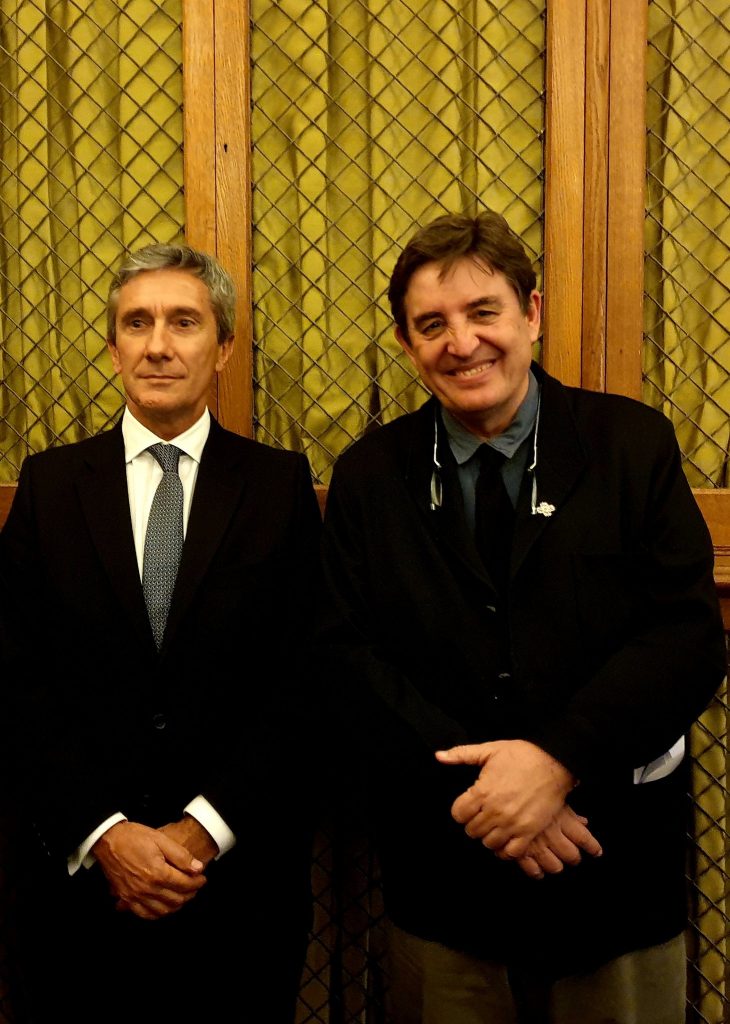
Twenty years ago, when this professor began working at Oxford, there was an average of approximately 150 applicants for 40 positions. «We have grown a lot, but the big difference is that there are more applications for Modern Languages, because when students apply to study here, they have to choose that route and then specify if they want Russian, Italian, Spanish or what language,» he pointed out.
While interest in French and German is going down, Spanish has broken that trend, and at the moment, there is still a good level of applicants: “I hope it is because they like the level of our course, but also because there are a lot of young people here interested in Hispanic culture and Spanish history, and want to travel and like to travel to countries where Spanish is spoken. ”
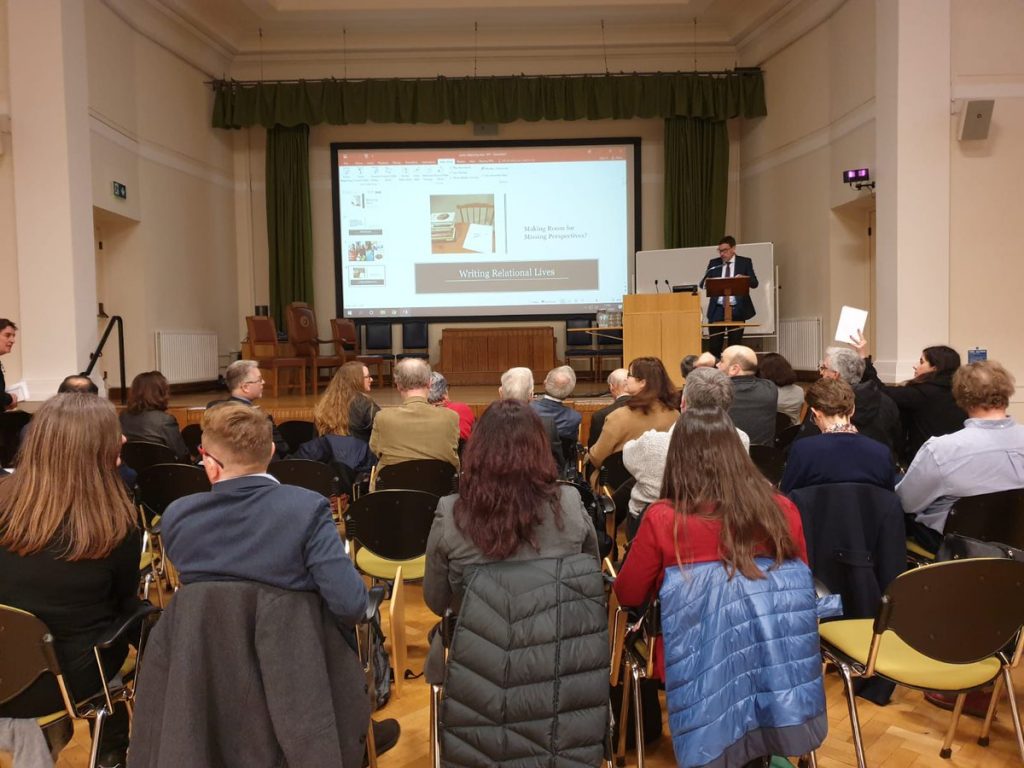
Future of the Spanish language
Thacker would like to continue seeing Spanish growing in the coming years and that the Sub-Faculty of Medieval and Modern Languages at the University of Oxford is able to accept all good applicants for Spanish studies, both undergraduate and graduate. Alongside this growth is also an impetus on always maintaining the current level of interdisciplinary interaction and with other Sub-Faculties in Oxford that there are today.
Oxford celebra su “valiosa relación” con el Instituto Cervantes en el cincuentenario de la Facultad de Español

El director del Instituto Cervantes, Luis García Montero, acudió hoy a las celebraciones del 50 aniversario de la Subfacultad de Español y Portugués en la Universidad de Oxford y firmará mañana un memorando de entendimiento (MOU) con Magdalen College.
“La participación del Instituto Cervantes en esta conmemoración se debe a que nuestra relación es muy valiosa”, reconoció el profesor Jonathan Thacker, catedrático Alfonso XIII de estudios españoles en Oxford, quien explicó que si bien el español se enseña en esta universidad desde hace más de 100 años, es ahora cuando siente que “es una lengua realmente vibrante”.

Experto en el Siglo de Oro español, el profesor Thacker afirmó que la asistencia de García Montero “no solo se debe a que es el director de una institución cultural muy importante, sino también un académico y un poeta, produciendo un tipo de literatura que enseñamos en Oxford. Queríamos que esta celebración fuese una combinación de contenido académico y un contenido más vivo”. En concreto, hubo lecturas de poesía del propio García Montero y la escritora portuguesa Ana Luísa Amaral.
Memorando de entendimiento con Magdalen College
“Este convenio es un reconocimiento de una trayectoria que lleva en marcha unos cuantos años y la consolidación de una colaboración futura que deseo que sea muy larga. Se trata de poner en negro sobre blanco lo que lleva tiempo desarrollándose, en especial en estos dos últimos años”, destacó el profesor de Literatura y Filología Medieval Española en la Universidad de Oxford, Juan Carlos Conde.
Para Conde, de lo que se trata con la firma de este memorando es de dar “carta de naturaleza y asegurarla para el futuro”. De hecho, tiene claro que la presencia de español en Oxford se ve fortalecida con dos iniciativas que se mencionan en el MOU: el Ciclo Madariaga y el Seminario de Estudios Medievales Ibéricos Magdalen (MIMSS, por sus siglas en inglés).

El Ciclo Madariaga surgió fruto de una iniciativa de un grupo de estudiantes de postgrado a finales de 2014. Entre los primeros invitados en 2015 hubo figuras de la talla de Miguel Ángel Moratinos o Javier Solana. Uno de los estudiantes detrás de la iniciativa, Diego Rubio, se dirigió a Conde para que Magdalen College le diese voz y visibilidad en Oxford y así fue como meses más tarde “les dio casa, techo y cobijo, así como una significativa contribución económica”. Y en el caso del ciclo MIMSS, se trata del seminario de estudios medievales más importante de Reino Unido en la actualidad.
“Quiero creer que estas actividades, en paralelo a la docencia y la formación, contribuirán a que la experiencia de los actuales y futuros estudiantes de Oxford sea más rica, proporcionándoles una serie de oportunidades que no tienen en otros lugares”, destacó Conde.
Estudiantes de español en Oxford
“Para estudiantes de grado que quieren estudiar aquí, tienen que haber cursado español previamente, hasta los exámenes de A-levels. Tenemos una media de entre 300 y 320 estudiantes que solicitan estudiar aquí y aceptamos entre 70 y 75, es decir, a uno de cada cuatro estudiantes. Creo que esto es una señal de la buena salud de la enseñanza de español en los colegios”, reconoció el profesor Thacker.

Hace 20 años, cuando el citado catedrático comenzó a trabajar en Oxford, había una media aproximadamente de 150 aplicantes para 40 puestos. “Hemos crecido bastante, pero la gran diferencia está marcada en que hay más aplicaciones por Lenguas Modernas, ya que cuando los estudiantes se postulan para estudiar aquí, tienen que escoger esa vía y luego especificar si quieren ruso, italiano, español o qué lengua”, puntualizó.
Mientras que el interés por el francés y el alemán está bajando, el español ha roto esa tendencia, y por el momento, todavía hay un buen nivel de aspirantes: “Espero que sea porque les gusta el nivel de nuestro curso, pero también porque hay mucha gente joven aquí interesada en la cultura hispánica y la historia española, y quieren viajar y les gusta viajar a países donde se habla español”.

Futuro del español
A Thacker le gustaría seguir viendo al español creciendo en los próximos años y que la Subfacultad de Lenguas Medievales y Modernas en la Universidad de Oxford sea capaz de aceptar a todos los buenos solicitantes de estudios de español, tanto de grado como de posgrado, pero siempre manteniendo el nivel actual de interacción interdisciplinario y con otras Subfacultades en Oxford que hay en la actualidad.
Spain recognises the work of the great British historian, Paul Preston
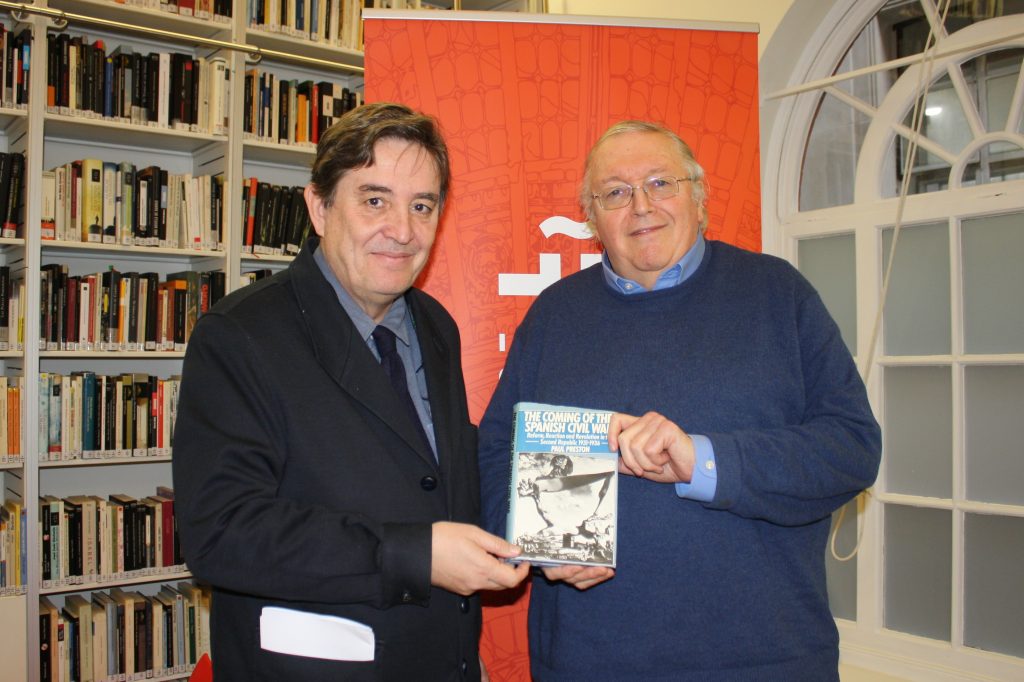
The British historian and Hispanist Sir Paul Preston (Liverpool, 1946) will make an announcement in London on February 28th, that he has chosen to leave a copy of the first book he published in the Caja de las Letras, Instituto Cervantes’ headquarters in Madrid.
The Caja de las Letras is a vault of safe-deposit boxes in a former bank building that has been repurposed as a time capsule for Hispanic culture. Many Spanish artists and thinkers have been invited to leave an artifact of their choosing in the security boxes, along with the date the safe should be reopened.
In the case of Sir Paul Preston, he has chosen a book based on his thesis, The Destruction of Democracy in Spain (1978) which contains notes written by Hispanist Sir Raymond Carr. The first box ever used was Number 1,000 and was filled by writer Francisco Ayala in 2007. And for the first time in the history of the boxes, Preston’s donation is going to be done away from Madrid.
As Sir Paul Preston suffers from specific health problems that prevent him from travelling to Spain, his donated book will be taken to Madrid in a red briefcase guarded by the director of Instituto Cervantes, Luis García Montero.
«It is a great honor to join the Caja de las Letras, especially when it seems that there are very few writers who are not Spanish-speaking, and that has moved me,» said the British historian, who chose to open his box in five years time.
The text, a documented study that traces the origins of the Spanish Civil War, was started from the doctoral thesis that he presented at the University of Oxford about the monarchical conspiracies against the Spanish Republic. It is a copy much valued by Sir Paul Preston because of the annotations from his teacher, British historian and Hispanist Sir Raymond Carr (1919-2015).
“If you leave an object without further ado, for me it does not have much interest for those who open the Caja de las Letras in the future. That is why I thought that if someone interested in my work opens it, this has twice the interest, since it is my book and is annotated by Raymond Carr. In addition, this copy arrived to me in a very strange way: a friend found it in a second-hand bookshop and then he gave it to me,” explained Sir Paul Preston.
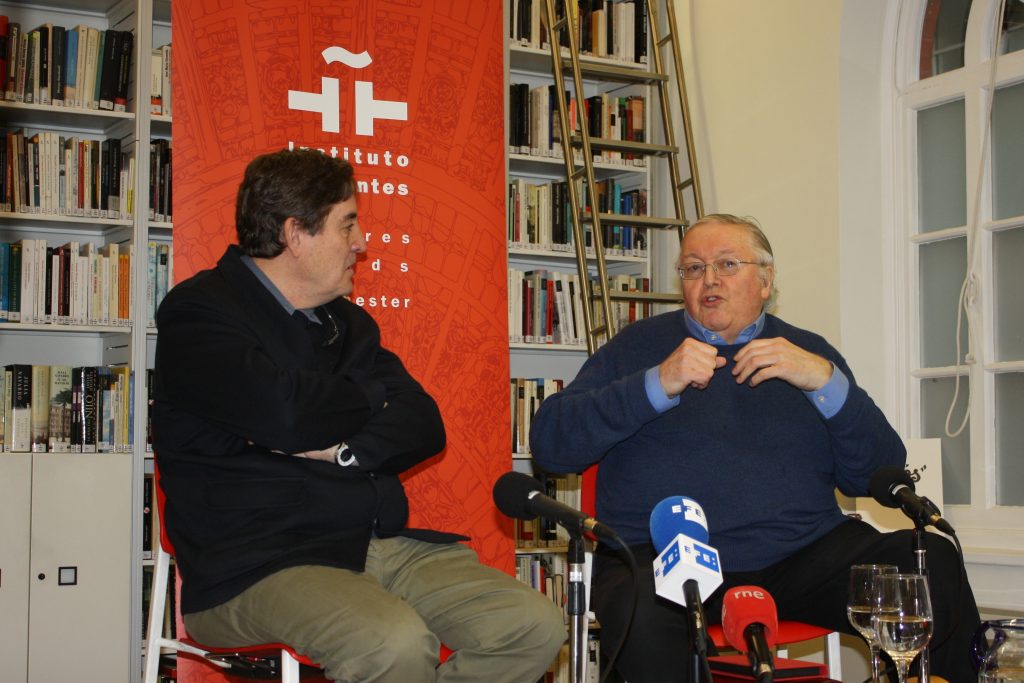
Disciple of Hugh Thomas
Sir Paul Preston’s childhood was spent in a working-class neighborhood of Liverpool, a city heavily punished by German bombing during World War II, as it was the port that received food and weapons shipments from the United States.
«I was born just after the War, but in my childhood the conversations of adults were very much about the bombings and the blitz, which came from the German expression blitzkrieg, quick war.» Very soon those stories became my favorite readings when I reached adolescence and I began to be interested in reading, above all, about the origins of World War II,” said the British historian.
Sir Paul Preston considered that he had «really incredible luck» for a working-class boy and from the North in being able to study History at Oxford University. «It was a small miracle and I was hoping, but among the subjects there were few which really impassioned me: almost everything was Constitutional History,» he added.
At the end of the race, and «wanting more», Sir Paul Preston again had «immense luck» when he was offered a scholarship to a postgraduate course on the period of Entreguerras (1918- 1939) at the University of Reading. “One of the subjects, the one that dealt with the Spanish Civil War, was given by Hugh Thomas. There I started teaching with him and everything fascinated me.”
From that moment, Sir Paul Preston began to «eat books» and read everything in English about the Spanish Civil War, realising that it was the perfect topic for his doctoral research: «It was a pandora box in which there was everything, fascism, communism, socialism, Freemasonry and great international figures (Stalin, Hitler, Trotsky…), etc.”
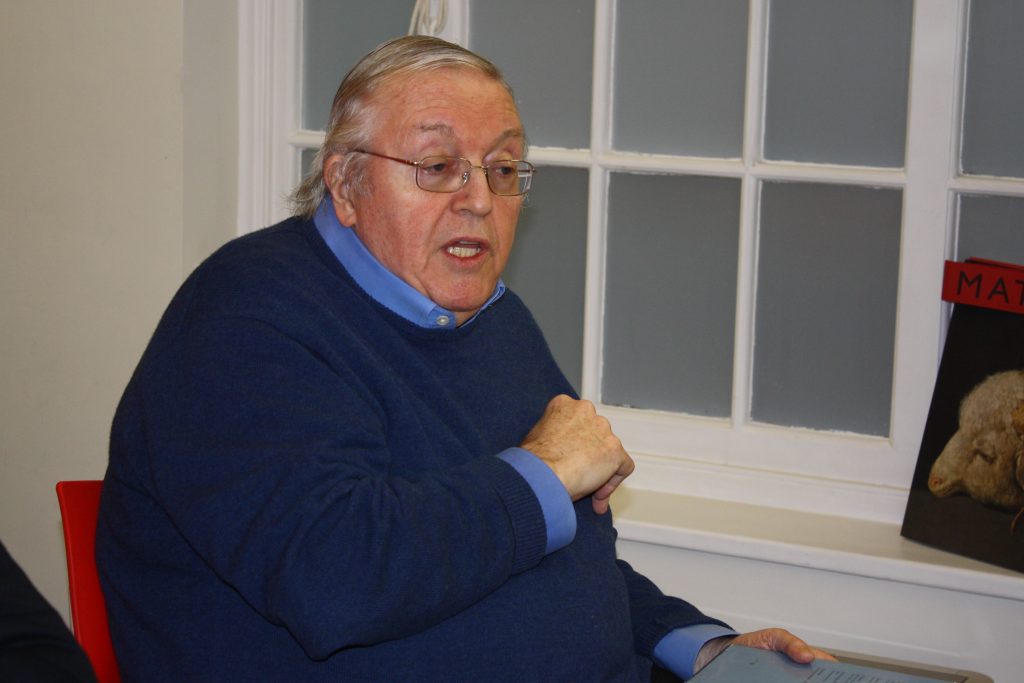
First trip to Spain
It was at that time that Sir Paul Preston decided that he «had to learn Spanish» and began to practice it with Colombian students in the cafeteria of the University. He traveled to Spain for the first time in the late 60s: “It was a great crush because Spain at that time had little to do with Spain today. I remember walking the streets of Madrid, the smells of food and the work of artisans.”
Sir Paul Preston acknowledged that he felt in love with Spain and was very excited with “the welcome that people gave me, I don’t know if it is like that now, but for someone who only babbled a couple of words in Spanish, people were very warm and they loved to see you and try to improve your Spanish, quite the opposite than in other countries.”
A life dedicated to the study of the History of Spain
Sir Paul Preston is a Doctor in History at the University of Oxford. He is a member of the British Academy and director of the Canada Blanch Centre of the London School of Economics, where he was Professor of International History for many years. Preston enjoys global fame as one of the greatest experts in the Spanish Civil War. He is also the author of reference biographies for Franco and Juan Carlos I.
Specialist in contemporary Spain, the historian has received the Commendation of the Order of Civil Merit and the Grand Cross of the Order of Isabel la Católica. Among his most outstanding works are Revolution and War in Spain 1931-1939 (1986); The Spanish Civil War (1987); Franco, leader of Spain (1994); Juan Carlos I (2003); The Spanish Holocaust (2011); the biography of Santiago Carrillo The red fox (2013), and his most recent and monumental work, A betrayed people: Spain from 1876 to the present day: Corruption, political incompetence and social division (2019).
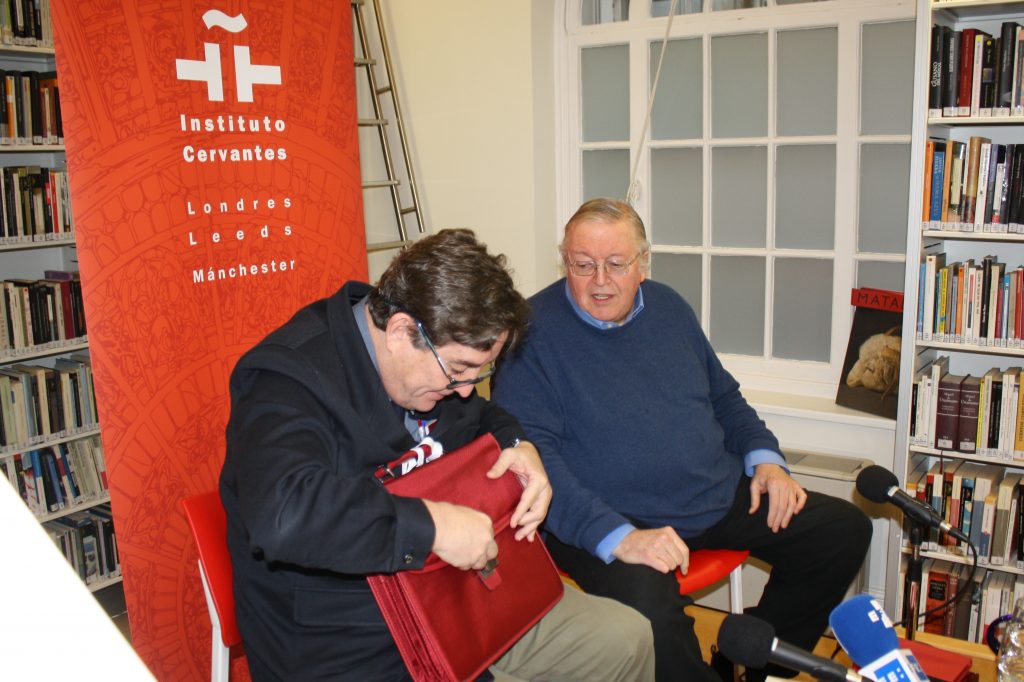
First artifact in La Caja de las Letras made from a distance
The artifact left by Sir Paul Preston is the first one that is made from a distance in the history of Instituto Cervantes. The book donated by the great British historian will travel in a red briefcase guarded by the director of the Spanish institution, Luis García Montero.
With the delivery of his legacy, Sir Paul Preston joins another Hispanist historian Sir John Elliott, the first native non-Spanish speaker invited by Instituto Cervantes to the former vault of its headquarters in October 2017. This month, Irish Hispanist Ian Gibson joined him, choosing to leave as a legacy two books by Gerald Brenan.
The Caja de las Letras celebrated its first decade in 2018 as a time capsule that keeps legacies ceded by cultural personalities in Spanish. Writers, artists, musicians, scientists, filmmakers or actors have left locked-up personal objects that are witnesses and memories of their life trajectory in the former vault of the Instituto Cervantes’ headquarters.
Throughout these years, prominent protagonists of the culture of Spain and Latin America have deposited their legacies in one of the 1,800 safety boxes located in the building known as the Cariátide, in the centre of Madrid. Through their basements, all the writers awarded the Cervantes Prize in the last two decades have passed: Antonio Gamoneda, Juan Gelman, Ana María Matute, Juan Marsé, José Emilio Pacheco, José Manuel Caballero Bonald, Nicanor Parra, Elena Poniatowska, Juan Goytisolo, Fernando del Paso and Eduardo Mendoza.
Narrator and essayist Francisco Ayala, Cervantes Prize 1991, was the one who inaugurated the Caja de las Letras in February 2007 with a secret legacy in box number 2,000. Since then, other illustrious authors in addition to those mentioned, such as Carlos Edmundo de Ory, Pablo García Baena or Jorge Edwards, have left their mark in this peculiar enclave where customers formerly deposited jewels and treasure.
Although writers make up the majority of the boxes (almost twenty), many other expressions of culture are also represented: art (Antoni Tàpies), science (Margarita Salas), music (Cristóbal Halffter, Luis de Pablo), dance (Alicia Alonso, Víctor Ullate), cinema (Luis García Berlanga), theatre (Nuria Espert), interpretation (Manuel Alexandre), photography and edition (Mario Muchnik) or literary management (Carmen Balcells).
The boxes each have a specific opening date, chosen by each guest. There is only one exception: composer Luis de Pablo asked that his safe be opened when he dies (therefore, it is not known when) and that in the same act the unpublished score that he left saved there must be read. So far, three boxes have been reopened: those of the literary agent Carmen Balcells, actor Manuel Alexandre and molecular biologist Margarita Salas.
Among other objects, it is worth mentioning the typewriter of the recently deceased Nicanor Parra, who ceded his grandson in 2012, since the Chilean poet, who was then 97 years old, could not come to Spain to collect the Cervantes prize.
Legacies in memoriam
The Caja de las Letras also keeps four legacies in memoriam, that is, personalities already deceased. Colombian Nobel laureate Gabriel García Márquez retains a box with land from his home in Aracataca. Antonio Buero Vallejo, his pipe and one of the pens with which he wrote the plays. From writer Miguel Hernández, a first edition of his earliest poems, Perito en lunas (1933). And from Argentine singer Atahualpa Yupanqui, handwritten postcards sent to his wife during his trips.
Sir Paul Preston, protagonista del primer “legado a distancia” de la historia del Instituto Cervantes

El hispanista e historiador británico Sir Paul Preston (Liverpool, 1946) anunció hoy en Londres que depositará en la Caja de las Letras del Instituto Cervantes en Madrid, a modo de legado, un ejemplar del primer libro que publicó, basado en su tesis, La destrucción de la democracia en España (1978), anotado por el también hispanista Sir Raymond Carr.
El legado de Sir Paul Preston es el primero que se hace a distancia en la historia del Instituto Cervantes. El historiador británico padece problemas puntuales de salud que le impiden desplazarse a España, por lo que el libro donado viajará en un maletín rojo custodiado por el director de la institución española, Luis García Montero.
“Es un gran honor unirme a la Caja de las Letras, máxime cuando parece que hay poquísimos escritores que no son de lengua española, y eso me ha conmovido”, destacó el historiador británico, quien eligió que se abra su caja en cinco años, pensando en que sea una fecha cercana.
El texto, un documentado estudio que rastrea los orígenes de la Guerra Civil española, nació de la tesis doctoral que presentó en la Universidad de Oxford sobre las conspiraciones monárquicas en contra de la República española, y es un ejemplar muy apreciado por el hispanista, ya que tiene anotaciones de su maestro de Sir Paul Preston, el también historiador e hispanista británico Sir Raymond Carr (1919- 2015).
“Si dejas un objeto sin más, para mí no tiene mucho interés para quienes abran la Caja de las Letras en el futuro. Por eso pensé que si la abre alguien interesado en mi trabajo, esto tiene el doble de interés, ya que es mi libro y está anotado por Raymond Carr. Además, a mí me llegó este ejemplar de una forma muy estrafalaria: una amiga lo encontró en una librería de segunda mano y luego me lo regaló”, explicó Sir Paul Preston.

Discípulo de Hugh Thomas
La infancia de Sir Paul Preston transcurrió en un barrio obrero de Liverpool, una ciudad muy castigada por los bombardeos alemanes durante la Segunda Guerra Mundial, ya que era el puerto que recibía los envíos de comida y armamento desde Estados Unidos.
“Yo nací justo después de la Guerra, pero en mi infancia las conversaciones de los adultos versaban mucho sobre los bombardeos y el blitz, que venía de la expresión alemana blitzkrieg, ‘guerra rápida’. Muy pronto esas historias se convirtieron en mis lecturas favoritas cuando llegué a la adolescencia y comenzó a interesarme leer, ante todo, sobre los orígenes de la Segunda Guerra Mundial”, comentó el historiador británico.
Sir Paul Preston consideró que tuvo “una suerte realmente increíble” para un chico de clase de obrera y del norte, de Liverpool, al poder ir a la Universidad de Oxford a estudiar Historia. “Fue un pequeño milagro e iba con muchas esperanzas, pero entre las asignaturas había pocas que me apasionaran de verdad: casi todo era Historia constitucional”, añadió. Al terminar la carrera, y “con ganas de más”, el profesor Preston volvió a tener “una inmensa suerte”, ya que le ofrecieron una beca para ir a estudiar a la Universidad de Reading un posgrado sobre el período de Entreguerras (1918-1939). “Una de las asignaturas, la que versaba sobre Guerra Civil Española, la daba Hugh Thomas. Ahí empecé a dar clase con él y me fascinó todo”.
Desde ese momento, Sir Paul Preston empezó a “zampar libros” y leer todo lo que había en inglés sobre la Guerra Civil española, dándose cuenta de que era el tema perfecto para su investigación doctoral: “Era una caja de pandora en la que había de todo, fascismo, comunismo, socialismo, masonería y grandes figuras internacionales (Stalin, Hitler, Trotsky…), etc ”.
Primer viaje a España
Fue en ese momento en el que Sir Paul Preston decidió que “había que aprender español” y empezó a practicarlo con estudiantes colombianos en la cafetería de la Universidad. A España viajó por primera vez a finales de los 60: “Fue un gran flechazo porque la España de entonces poco tenía que ver con la España de hoy. Me acuerdo de andar por las calles de Madrid, de los olores de la comida y los trabajos de los artesanos”.
Sir Paul Preston reconoce que se enamoró de España y se emocionó mucho con “la bienvenida que me daba la gente, yo no sé si es así ahora, pero para alguien que solo balbuceaba un par de palabras en español, la gente tenía un tremendo calor y les encantaba verte e intentar mejorar tu español, todo lo contrario que en otros países”.

Una vida dedicada al estudio de la Historia de España
Sir Paul Preston es doctor en Historia por la Universidad de Oxford. Es miembro de la British Academy y director del Cañada Blanch Centre de la London School of Economics, en la que fue profesor de Historia internacional durante muchos años. Preston goza de fama global como uno de los mayores expertos en la Guerra Civil española. Es también autor de biografías de referencia de Franco y de Juan Carlos I.
Especialista en la España contemporánea, el historiador ha recibido la Encomienda de la Orden del Mérito Civil y la Gran Cruz de la Orden de Isabel la Católica. Entre sus obras más destacadas están Revolución y guerra en España 1931-1939 (1986); La Guerra Civil española (1987); Franco, caudillo de España (1994); Juan Carlos I (2003); El holocausto español (2011); la biografía de Santiago Carrillo El zorro rojo (2013), y su más reciente y monumental, Un pueblo traicionado: España de 1876 a nuestros días: Corrupción, incompetencia política y división social (2019).

Primer legado a distancia
El legado de Sir Paul Preston es el primero que se hace a distancia en la historia del Instituto Cervantes. El libro donado por el gran historiador inglés viajará en un maletín rojo custodiado por el director de la institución española, Luis García Montero.
Con la entrega de su legado, Sir Paul Preston se une a otro hispanista británico, Sir John Elliott, el primer hablante nativo no español invitado por el Instituto Cervantes a la Caja de las Letras de su sede en octubre de 2017. Este mes, se sumó el hispanista irlandés Ian Gibson, quien dejó como legado dos libros de Gerald Brenan.
La Caja de las Letras cumplió su su primera década en 2018 como cápsula del tiempo que guarda legados cedidos por personalidades de la cultura en español. Escritores, artistas, músicos, científicos, cineastas o actores han dejado custodiados bajo llave, en la antigua cámara acorazada de la sede del Instituto Cervantes, objetos personales que son testigo y recuerdo de su trayectoria vital.
A lo largo de estos años, destacados protagonistas de la cultura de España e Hispanoamérica han depositado sus legados en alguna de las 1.800 cajas de seguridad ubicadas en el conocido como edificio de las Cariátides, en el centro de Madrid. Por sus sótanos han pasado todos los escritores galardonados con el Premio Cervantes en los dos últimos lustros: Antonio Gamoneda, Juan Gelman, Ana María Matute, Juan Marsé, José Emilio Pacheco, José Manuel Caballero Bonald, Nicanor Parra, Elena Poniatowska, Juan Goytisolo, Fernando del Paso y Eduardo Mendoza.
El narrador y ensayista Francisco Ayala, premio Cervantes 1991, fue quien inauguró la Caja de las Letras en febrero de 2007 con un legado secreto en la caja número mil. Desde entonces, otros ilustres autores además de los mencionados, como Carlos Edmundo de Ory, Pablo García Baena o Jorge Edwards, han dejado su huella en este peculiar enclave donde los clientes de las sucesivas entidades bancarias que aquí se ubicaron décadas atrás atesoraban dinero, joyas u otros valiosos bienes.
Aunque los escritores son mayoría (casi una veintena), otras muchas expresiones de la cultura están asimismo representadas: el arte (Antoni Tàpies), la ciencia (Margarita Salas), la música (Cristóbal Halffter, Luis de Pablo), la danza (Alicia Alonso, Víctor Ullate), el cine (Luis García Berlanga), el teatro (Nuria Espert), la interpretación (Manuel Alexandre), la fotografía y la edición (Mario Muchnik) o la gestión literaria (Carmen Balcells).
Las cajas tienen fecha concreta de apertura, elegida por cada invitado. Solo hay una excepción: el compositor Luis de Pablo pidió que su caja de seguridad se abra cuando él muera (por tanto, no se sabe cuándo) y que en el mismo acto se interprete la partitura inédita que dejó guardada. Hasta el momento se han reabierto tres cajas: las de la agente literaria Carmen Balcells, el actor Manuel Alexandre y la bióloga molecular Margarita Salas.
Entre otros objetos, cabe citar la máquina de escribir del recientemente fallecido Nicanor Parra, que cedió en 2012 su nieto, ya que el poeta chileno, que contaba entonces con 97 años, no pudo venir a España a recoger el premio Cervantes.
Legados in memoriam
La Caja de las Letras también guarda cuatro legados in memoriam, es decir, de personalidades ya fallecidas con anterioridad. Del Nobel colombiano Gabriel García Márquez conserva una arqueta con tierra de su casa natal en Aracataca. De Antonio Buero Vallejo, su pipa y uno de los bolígrafos con los que escribía las obras dramáticas. De Miguel Hernández, una primera edición de su poemario más temprano, Perito en lunas (1933). Y del cantor argentino Atahualpa Yupanqui (el legado más reciente, del pasado 19 de enero), tarjetas postales escritas a mano y enviadas durante sus viajes a su esposa.
Spanish-British culture figures analyze the bilateral cultural relationship after Brexit
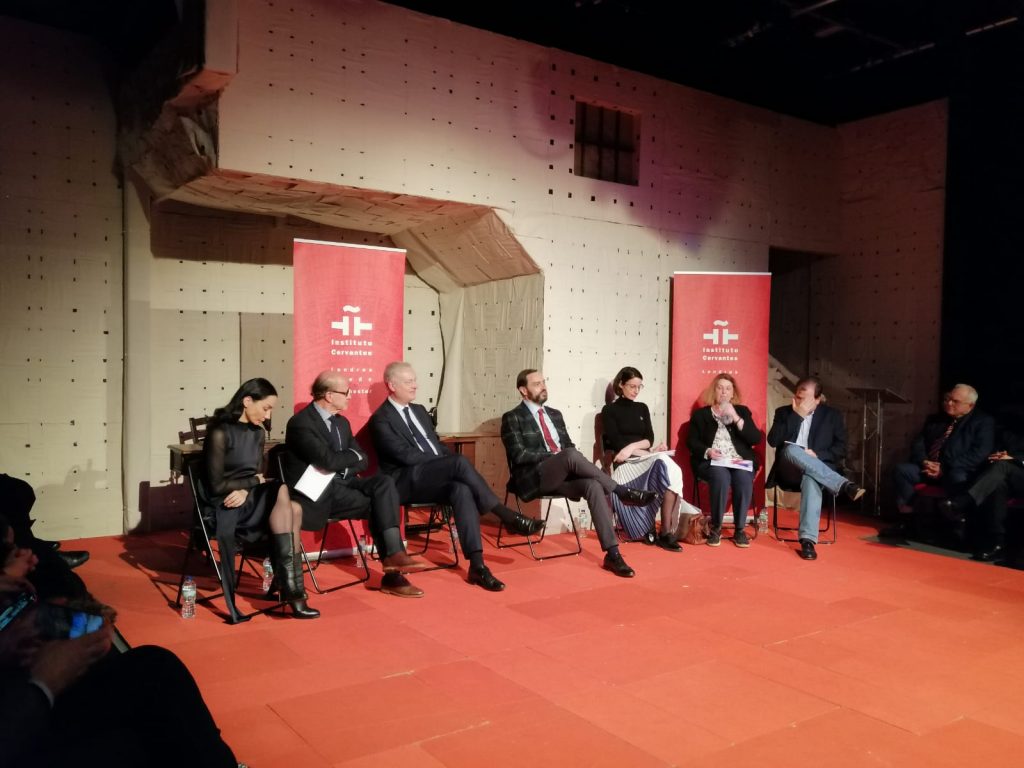
Outstanding figures of British Hispanic culture have participated in the round table Future: English & Hispanic Culture After Brexit, in which they highlighted the necessity of unifying both countries to face the challenges and seize the opportunities after Brexit. One of the main issues discussed focused on the relevance of Spanish as a relevant language for everyday life and its incredible growth in British schools. The event took place at the Cervantes Theatre under the auspices of the Instituto Cervantes in London and with support from the Spanish Embassy.
The round table was introduced by the Ambassador of Spain to the United Kingdom, Carlos Bastarreche as well as the Ambassador of Honduras to the United Kingdom. Subsequently, the director of Instituto Cervantes, Luis García Montero, paid a tribute to British Hispanism, praising the work of great historians and academics such as Sir John Elliott, Sir Paul Preston and the recently deceased, Trevor Dadson.
The round table was moderated by the correspondent of El País in the United Kingdom, Rafa de Miguel, and had the following speakers: the director of the English National Ballet (ENB), Tamara Rojo; the Ambassador of Ecuador to the United Kingdom and novelist, Jaime Marchán; former United Kingdom ambassador to Spain, Simon Manley; the director of the Institute for Modern Languages Research (IMLR), Catherine Davies; the president of the Society of Spanish Scientists in the United Kingdom (CERU), Rocio Gaudioso; and the researcher of the Elcano Royal Institute, Ignacio Molina.
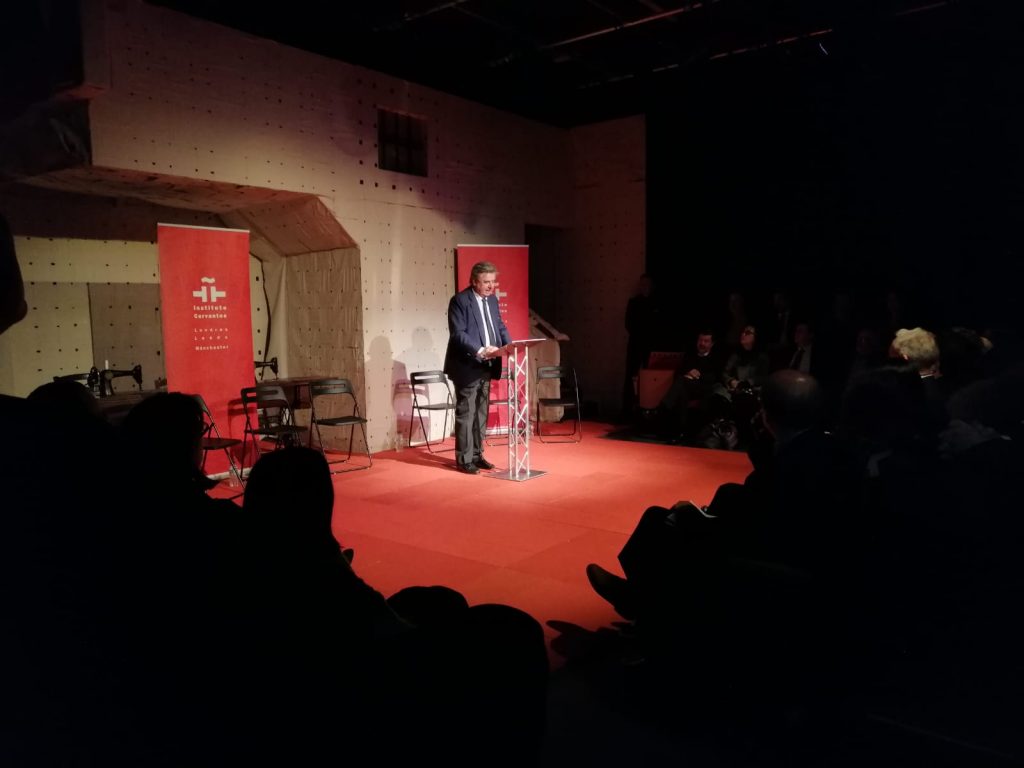
The value of language as a human right
The Ambassador of Ecuador to the United Kingdom and novelist, Jaime Marchán, pointed out that Brexit is “the democratic realisation of the decision of a member country to leave the EU”. However, he said that, like any change, it can also be «seen as an opportunity» and believes that, from now on, we will see a European country with greater autonomy to play an important global role in all areas, including cultural aspects.
For Marchán, Brexit «invites us to reflect on the universal power of the English language beyond all borders» and cited a memorable phrase by George Steiner, a fundamental figure of critical thinking of the twentieth century, which in his opinion summarises the perfection the multicultural sense of language and literature: «Give me a work table and I already have a homeland.»
In fact, his commitment as Ambassador is “for a better reciprocal knowledge of both languages: Spanish and English”, highlighting how the Cervantes Institute and the British Council are an important cultural base to increase better and greater knowledge, not only of the languages, but of the Latin American and English cultures. But language is not just words, and as such, he insisted on the importance of «the value of language as a human right.»
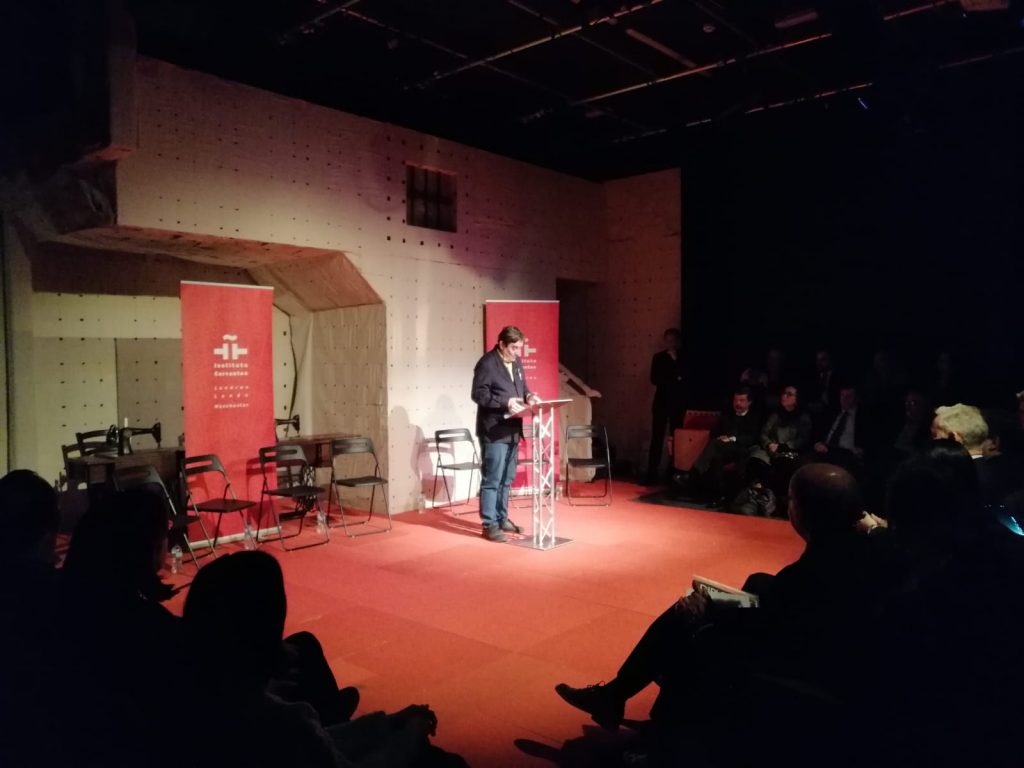
«The incredible growth» of Spanish in British schools
The former United Kingdom ambassador to Spain, Simon Manley, hopes that the future of the cultural relationship between the United Kingdom and the Hispanic world after Brexit will be “very rich”, extolling the links and opportunities, especially “thanks to the efforts of so many Spaniards so talented in our country. ”
For Manley, the current challenge is «uncertainty and false news” but he appreciates that future opportunities»are more important». Our two countries are proud of their great traditions, but with international views and innovative visions. In addition, he highlighted “the incredible growth” of Castilian in British schools, and how, the Hispanic culture advances in several dimensions, with Netflix series such as La casa de papel a la flamenco, cine, or gastronomia.
Spanish, a language relevant to everyday life
The director of the Institute for Modern Languages Research (IMLR), Catherine Davies, noted that in the last ten years, the number of students enrolling in modern languages has decreased, especially in German and French, but not in the case of Spanish and Portuguese, which have grown in importance, status and impact in the higher education sector.
In the case of Spanish studies in schools, Davies believes that interest in Spanish has grown tremendously in the last 20 years: “Spanish is considered relevant for everyday life, mainly because most Britons and their children have visited Spain and have spent their holidays there. Many British expatriates live in Spain, especially grandparents. Spanish is an easy language to acquire at a basic level, so communication can be established quickly. Young people are motivated, feel they are making progress and can test their language skills on vacation. ”
Davies points out that Brexit will make «it will be more difficult to recruit university professors and professors from Spain» and did not hide her concern about how «the constant traffic of goods and people between the two countries can be seriously compromised». However, Davies also pointed out that British interest in Spain started prior to the entry of the United Kingdom into the EU.
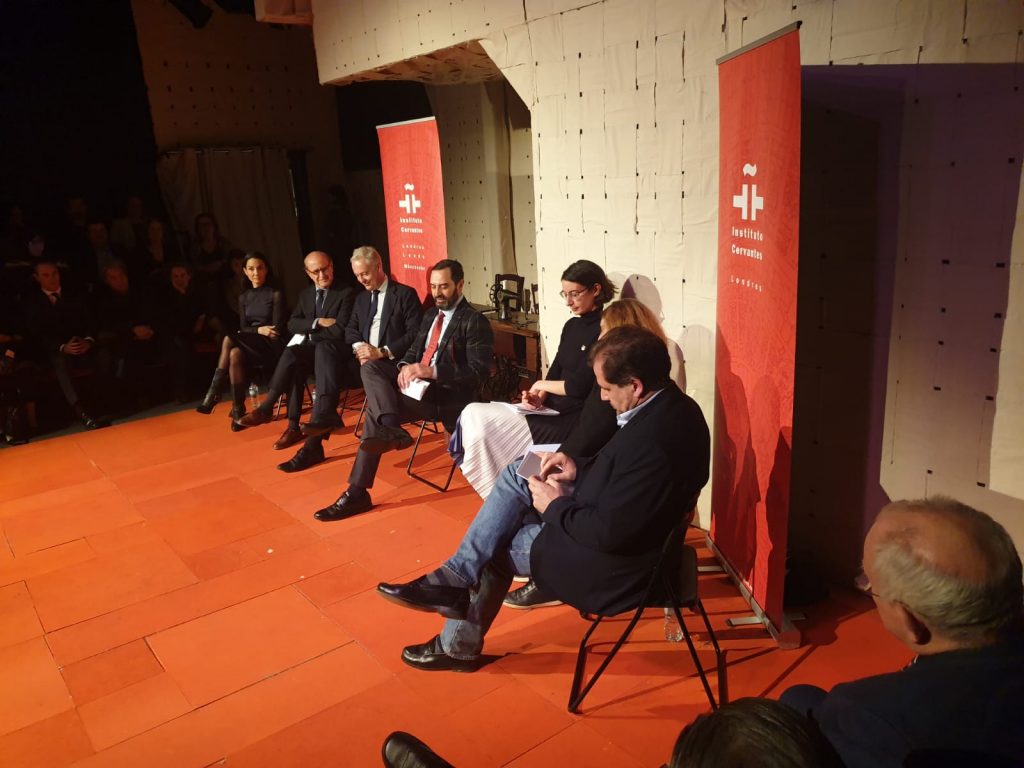
United Kingdom and the European Union are needed
The president of the Society of Spanish Scientists in the United Kingdom (CERU), Rocio Gaudioso, stressed that the scientific community is in a situation with respect to Brexit which is, «at the same time, an opportunity and a challenge: research cannot be done in isolation, the United Kingdom and the European Union need each other to maintain their competitiveness and to face the social and technological challenges that come ”.
Gaudioso also pointed out that Spanish-British relations in research are “mature and well founded in respect and admiration between both countries’. This situation can help reduce the negative effects of Brexit, but he stressed that “the damage is already becoming visible and it can only be prevented with the strength of diplomacy and scientific collaboration. Our governments must remember our common objectives so that we can face the upcoming challenges”.
Gaudioso is clear that “research has always been, and always will be, a global mission. The challenges we face cannot be solved by countries in isolation and this is something that both researchers and governments know. The promises and good wishes are there but now we need the political will on both sides of the channel to reflect this desire and make a relationship as close as possible so that the research community can continue working together. ”
Two aspects of the future relationship between the United Kingdom and Spain
During the round table, the researcher of the Elcano Royal Institute, Ignacio Molina, alluded to two aspects of the future relationship between the United Kingdom and Spain. The first focuses on a more European dimension: trying to answer the question of why the British perception of the rest of EU citizens has always been so different about what the integration process is and should be .
“Among the 27 (and singularly in Spain) it has tended mostly to see Europe as the solution to national problems in terms of peace, security, prosperity, welfare, normalisation, democracy. On the other hand, neither the elites nor the public opinion of the United Kingdom has been deeply aware that their national being was «problematic» or «threatened» and, therefore, they have not seen the EU as that great company for the future that it was its own, but rather as a pragmatic calculation or a simple lesser evil, ”said Molina.
In the second aspect of his participation in the table, he dealt specifically with the bilateral relationship between the United Kingdom and Spain. In this case, he was interested in raising, with some optimistic provocation, the opinion “that there is no longer enmity between two States in the History of International Relations (partly because they are two of the oldest States in the world) nor is there another case in two countries that, being neither neighbors nor sharing language, now have such an intense relationship and potential for harmony. Harmony that at the moment has not been expressed so much in politics (partly because of the very different ways in which both countries view European integration or the old contentious matter of Gibraltar) but it is interesting to take into account the focus of the rest of the speakers at the table, in the cultural, personal and business aspects ”.
For Molina, it is clear that “Brexit marks a before and after in how we can relate between the United Kingdom and the EU. It is inevitable that the relationship suffers on all levels. And we are waiting to see how that agreement of the future is shaped from 2021. Right now, the main challenge is to avoid a hard Brexit, although it cannot be entirely optimistic. However, I don’t think you have to be so pessimistic about the specific Hispanic-British link. ”
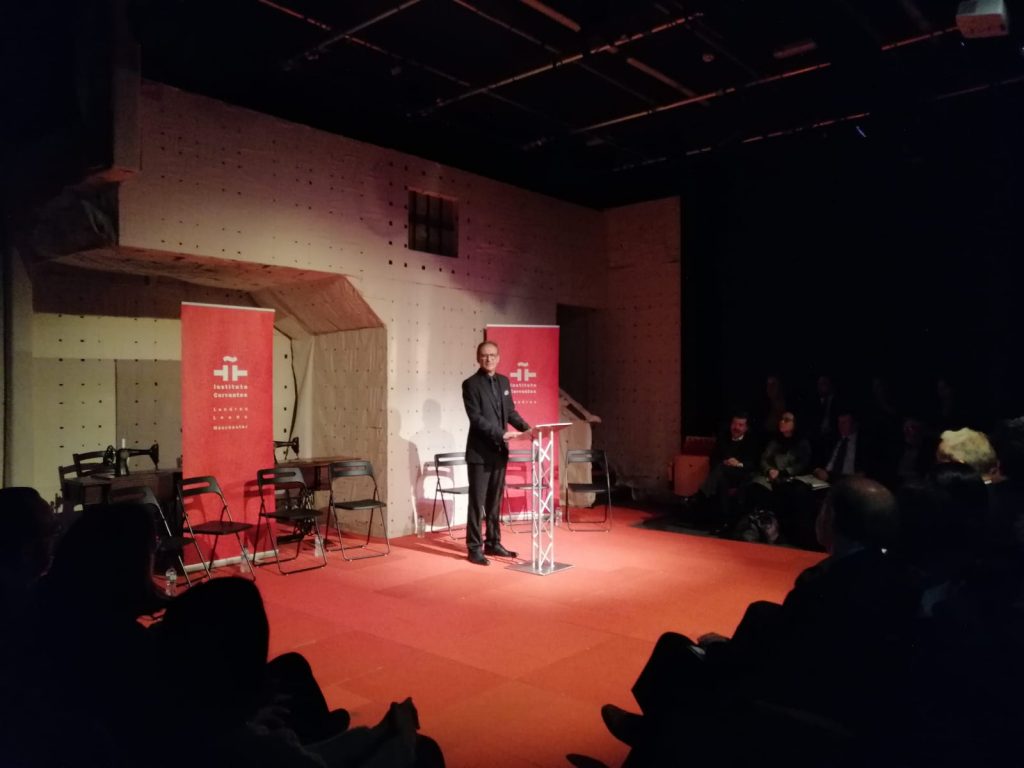
Poetry reading at the Cervantes Theatre
The event concluded with a recital of Spanish love poetry in tribute to the Spanish Trevor Dadson in charge of the artistic director of the Cervantes Theatre, Jorge de Juan. This is the first Spanish-speaking theatre in the history of British theatre and its associate director called for the United Kingdom and Spain to consolidate «the strong ties that have always existed between our two communities.»
“At the Cervantes Theatre, now more than ever, we have to continue spreading our culture and our language, which continues to grow and is studied by British students more than ever. We want to be the gateway for many young Spaniards and Latin Americans who want to continue dreaming of a better future in a country they admire for their history and their people,” said De Juan.


